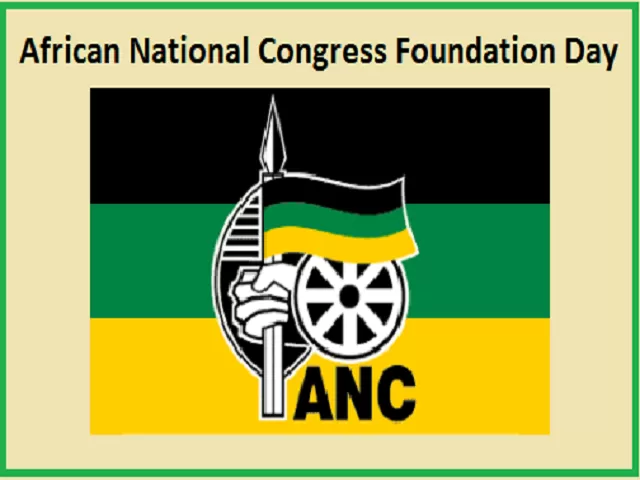African National Congress Foundation Day 2024: African National Congress (ANC) was formed on 8 January 1912. Its primary goal was to unite African people and defend their rights and freedoms.
South Africa's governing party is the African National Congress and has been in power since the transition to democracy in April 1994.
[WATCH LIVE] ANC CELEBRATES ITS 112TH ANNIVERSARY #ANC112 #ANCNECInMP #RegisterToVoteANC https://t.co/GS0KbneEXC
08 January 2024, marking 112 years since the founding of the people's liberation movement.#ANC112 #ANCJan8
🖤💚💛 pic.twitter.com/jT3PeTh5aF
[PHOTOS] The President of the African National Congress, Comrade Cyril Ramaphosa, with members of the local ANC branch shortly after laying a wreath at the grave of the late Dr. Enos Mabuza at Louwville Cemetery in Mpumalanga Province. #ANCPilgrimage #ANC112 pic.twitter.com/z2v78FhtuK — African National Congress (@MYANC) January 8, 2024
How was African National Congress (ANC) formed?
It was a landmark in the history of Africa that marked the beginning of the end of centuries of exploitation and humiliation of the continent.
Initially, the organization was founded as the South African Native National Congress (SANNC) on 8 January 1912 in Bloemfontein. Its aim was to fight for the rights of black South Africans, to bring all Africans together as one people, and to defend their rights and freedoms. That is to give full voting rights to Black South Africans and mixed-race South Africans. Also, to end the apartheid system that was introduced by the National Party government after their election victory in 1948.
It is said that the ANC was formed when South Africa was changing very fast like diamonds were discovered in 1867 and gold in 1886. At that time, bosses at Mines wanted large numbers of people to work for them in the mines. On the other hand laws and taxes were designed to force people to leave their land. The most severe law was the 1913 Land Act. It prevented Africans from buying, renting, or using land, except in the reserves.
The SANNC was leading a campaign against passes which were an ID that black South Africans had to possess by 1919. It then became dominant in the mid-1920s.
In 1919, the Industrial and Commercial Workers Union (ICU) which was a general union also formed and was the most active and popular organization in rural and urban areas at this time. Some major victories were won by this union through militant actions but it could not sustain itself and in the late 1920s collapsed.
In the 1920s, Socialist organizations also began to organize black workers. In 1921, the International Socialist League and other social organizations together formed the Communist Party.
The Communist Party became the first non-racial political organization in South Africa. Government policies became harsher and more racist during the 1920s. As a result, a colour war was established to stop blacks from holding semi-skilled jobs in some industries. Also, black workers were paid low wages for unskilled work.
SANNC in 1923 became the African National Congress and supported a militant mineworker's strike in 1929. The early period of the organization was characterized by political inertia due to power struggles and lack of resources; increasing repression and the entrenchment of white minority rule galvanized the party.
Due to the establishment of Apartheid, its aversion to dissent by Black people, and the brutal crackdown of political activists, the ANC together with the SACP established a military wing named uMkhonto we Sizwe (Spear of the Nation/ MK) in 1961.
With MK, the ANC waged the armed struggle and obtained support from some African countries and the Soviet bloc for its activities. Due to the increasing of internal dissent, international pressure, and the collapse of the Soviet Union, the apartheid government was forced to enter into negotiations with the ANC. As a result, apartheid collapsed and democratic rule was established in 1994.
Nelson Mandela was elected President in the National Conference of ANC held in 1991. Oliver Tambo was elected as National Chairperson. He served as President from 1969 to 1991. In April 1993, Tambo died after serving with the ANC his entire adult life.
ANC held its first historic elections that were based on one person one vote in April 1994. ANC won the first election with a vast majority. Nelson Mandela was inaugurated as the President of South Africa on 10th May 1994.
READ| Important Days in January 2024: National and International Dates List
What is the Significance of African National Congress Day?
African National Congress (ANC) Day, holds immense significance in South Africa's history and present. It marks the founding of the ANC. Here's a closer look at its importance:
1. A Beacon of Hope and Unity:
In the early 20th century, South Africa was a deeply divided nation with racial segregation and discrimination rampant. The ANC emerged as a beacon of hope and unity for the Black majority, advocating for equal rights and representation.
2. A Long Struggle for Freedom:
The ANC's journey was fraught with challenges and sacrifices. For decades, it faced persecution, the ban, and imprisonment of its leaders, yet it persevered through non-violent resistance and civil disobedience campaigns.
3. Building a New Nation:
Since then, the ANC has been at the forefront of building a new, inclusive South Africa. It has focused on addressing social and economic inequalities, promoting reconciliation, and strengthening the nation's democracy.
4. A Day of Reflection and Celebration:
ANC Day is not just about commemorating the past; it's also a day to celebrate the present and look towards the future. It's a time to reflect on the sacrifices made, acknowledge the progress achieved, and recommit to building a better South Africa for all.
